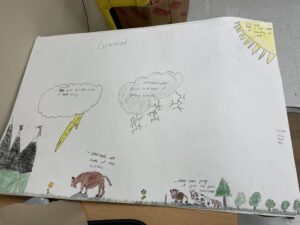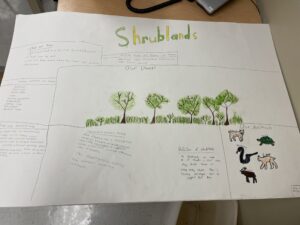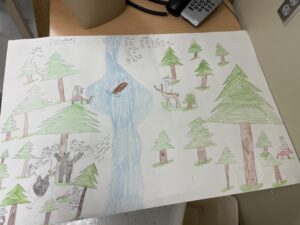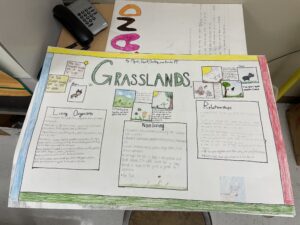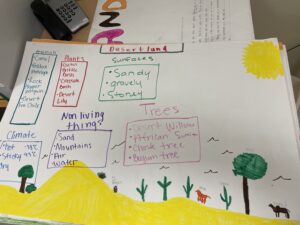Final report for LNC19-419
Project Information
The protection and preservation of rangelands is integral to key ecosystem services within the North Central Region (NCR) such as biodiversity, recreation, and food and fiber production. Educating youth through a sustainable agriculture curriculum can serve as the direct link to the future sustainability of rangelands in the Great Plains and South Dakota. This project, entitled “Investigating Rangeland Systems and Practices: Enhancing Sustainable Agriculture Curriculum in South Dakota,” was focused on educating youth in grades 6, 7, and 8 about sustainable agriculture through a lens of rangeland systems and practices. Our overall objectives were to promote sustainable agriculture curriculum through educational events for teachers and 4-H Youth Program Advisors, and have educators and youth learn about sustainable agriculture through a rangeland lens. To maximize reach, we conducted workshops for teachers and 4-H Youth Program Advisors, providing educators with lesson and laboratory/field exercises that align with the Next Generation Science Standards. All lessons and laboratory/field exercises involve active learning strategies, such as think-pair-shares and small group discussions, as well as experiential and hands-on learning. We collaborated with ranchers in North Dakota and Montana with ranchers to provide vlogs (video blogging) for the curriculum. Students and educators learned about the local, national, and worldwide impacts sustainable agriculture has on people, the economy, and the protection of natural resources. This project resulted in increased awareness of sustainable agriculture among youth, including challenges faced, impacts of management strategies, and career opportunities. Ultimately, the long-term impacts of this project beyond the life of the grant will provide youth and, consequently, their families an objective understanding of what farmers and ranchers are doing, making them informed citizens and cognizant neighbors and future voters.
We modified our objectives from the initial grant proposal to the following for this final report:
Learning outcomes: 1) teachers and 4-H Youth Program Advisors will learn about sustainable agriculture and how to teach the curriculum.
Action outcomes: 1) the curriculum will be adopted by teachers and 4-H Youth Program Advisors within the NCR.
Condition outcomes: 1) increased concern for the protection and conservation of natural resources, 2) increased labor force in agricultural fields.
This final report includes activities from November 1, 2019 to December 31, 2023. Below we provide an overview of activities that occurred during the grant period. Of note is that we completed a budget reallocation and no-cost extension (NCE) request in July 2022. The main reason for the budget request was that instead of doing stand alone workshops with teachers, we actively incorporated the modules into Extension and outreach activities that already exist. The rationale for the NCE is to continue producing outputs for the grant. The request was approved by SARE.
Activities completed during the grant period:
- 5 Core Curriculum Modules with Lessons
- Module 1: Overview of Rangelands
- Module 2: Rangeland Plants
- Module 3: Rangeland Animals
- Module 4: Soil Health
- Module 5: Foraging
- 7 Workshops and presentations for Teachers, 4-H YPAs, and Youth. Total participants = 81 adults and 135 youth.
- 10/27/2021, 19 adult participants, SDSU Extension Fall Conference; Brookings, SD
- 2021-2022 school year, Pilot of the curriculum conducted with Mobridge Middle School, 2 adults, approximately 40 youth; Mobridge, SD
- 2/4/2022, 4 adult participants, SD STEM Teaching Association Conference; Huron, SD
- 5/12/2022, 24 adult participants, SD 4-H Professionals’ Spring Training; Yankton, SD
- 7/26/2022, 5 adult participants, SD Career and Technical Education (CTE) Conference; Sioux Falls, SD
- 7/27/2022 and 7/28/2022, 2 adult participants, 95 youth participants, Dakota Dreams Camp; Brookings, SD
- 11/30/2023, 25 adult participants, National Association of Agricultural Educators (NAAE) Annual Conference; Phoenix, AZ
- 3 Field Activities for Educators and Students. Total participants = 9 adults, 30 youth.
- 1 field trip, 10/15/2021 with Mobridge Middle School for the pilot of the curriculum; 4 adults, approximately 40 youth, Mobridge, SD
- 1 event, 6/14/2022 and 6/15/2022, 3 adult participants, 15 youth participants, SD Rangeland and Soils Days; Murdo, SD
- 1 event, 6/14/2023 and 6/15/2023, 6 adult participants, 15 youth participants, SD Rangeland and Soils Days; Watertown, SD
- The SD Rangeland and Soils Days is held annually in June in South Dakota. PI Ehlert helps lead Rangeland and Soils Days and at the event in June 2022, some components of the SARE modules were woven into working with the “New Rangers” group of 8-10 year old kids.
- Participant support costs were used in June 2023 to fund travel and supplies for the New Rangers group of students to attend Rangeland and Soils Days.
- 15 Video Blogs (Vlogs) with Participating Ranchers. Total participants = 5 ranchers.
- 1 Extension Article
- 10/2023, Ehlert and Rohrer. Range Roundup: Opportunities for Youth.
- 2 Conference Presentations
- 2/16/2021, unknown attendee number, Society for Range Management Annual Meeting; virtual (COVID)
- 11/30/2023, 25 adult participants, National Association of Agricultural Educators (NAAE) Annual Conference; Phoenix, AZ
After the conclusion of the grant, the following is ongoing:
- 1 Journal Article
- To be submitted to a journal such as the Journal of Agricultural Education.
- 1 Conference Presentation
- 1/29/2024, Society for Range Management Annual Meeting; Sparks, NV
Cooperators
Research
Education
Our overall objectives were to promote sustainable agriculture curriculum through educational events for teachers and 4-H Youth Program Advisors (YPAs), and have educators and youth learn about sustainable agriculture through a rangeland lens. We have focused on workshops for teachers and 4-H YPAs. Experiential and hands-on learning were at the core of this project. Instead of having ranchers directly involved in the curriculum, from a time constraint process, the grant Co-PIs led the curriculum effort. As a result, we conducted a pilot of the curriculum with Mobridge Middle School (Mobridge, SD). This allowed us to change the curriculum based on feedback from a middle school teacher and students. For example, some time estimates we had on activities were much too short, and actually took twice as long due to needing to conduct the activity with 20-25 students! We also learned from the Pilot that we needed to provide educators with more background information so that s/he felt confident presenting the material to students.
We developed five core curriculum modules: Module 1: Overview of Rangelands, Module 2: Rangeland Plants, Module 3: Rangeland Animals, Module 4: Soil Health, and Module 5: Foraging.
Hands-on experiential learning is woven throughout all curriculum modules. All of the components of the curriculum modules translate well to Bloom’s taxonomy, which is a framework for categorizing educational goals, and is familiar to teachers and 4-H YPAs. To illustrate how one of our curriculum modules connects to specific Next Generation Science Standards we will focus on an example of Module 2: Rangeland Plants. Students will first learn how to differentiate between types of plants such as grasses, forbs, and shrubs. This aligns with MS-LS1: From Molecules to Organisms: Structures and Processes and challenges students to think about how plants reproduce, what impact environmental conditions have on growth, and the effects that characteristics such as flower color can have on pollinator attraction and therefore reproduction (Performance Standards MS-LS1-4 and MS-LS1-5). Further, there will be a focus on grasses so that students learn about different photosynthetic pathways and the cycling of matter and energy flow into and out of organisms (Performance Standards MS-LS1-6).
We presented the curriculum and held workshops for teachers and 4-H YPAs.
Workshop attendees were given materials including modular lesson plans and when available, any materials needed to complete each activity. Lesson plans and laboratory/field exercises provide a summary of the activity and learning outcomes, and alignment with the Next Generation Science Standards and South Dakota Standards of Learning. Further information such as appropriate classroom assessment techniques (CATs) and references are outlined for each lesson. When possible, we provided participant support costs to teachers and 4-H YPAs to offset the cost of mileage and lodging.
We developed 15 video blogs ("vlogs") that feature ranchers in the NRC across a variety of timepoints in the ranching and beef cattle world.
In our original grant proposal, we suggested an approach we called “Adopt-a-Rancher” where ranchers would develop video blogs (“vlogs”) to amplify a rancher’s viewpoint, thought processes, and daily decisions, as well as the seasonal foresight and adaptability needed to achieve sustainable and regenerative ranching practices. Vlogs were intended to “attach a face” to a person (i.e. a rancher) perhaps previously unknown to students and their families. Finally, we had proposed field trips to ranches to expose students to practical skills such as plant identification and rangeland health assessment, as well as provide the opportunity to interact directly with someone who is invested in the future of sustainable agriculture.
As a result of COVID-19, we quickly adapted to the fact that it was difficult to get students and teachers on field trips to ranches due to COVID restrictions. Further, it was also very difficult to have the ranchers themselves provide vlogs - they often had older cell phone models that resulted in poor video quality, so we did purchase some GoPros and associated video equipment to help with this. However, the ranchers we initially were collaborating with on the project seemed unsure of where to start with the videos. Thus, we removed the "Adopt-a-Rancher" component of the project, and instead relied on a contractor to conduct short vlogs with producers in the NCR. This avenue allowed us to have more control over the consistency of the video footage - the quality, sound, etc. Moreover, vlogs served as a “day in the life” for students to see and hear what a rancher does and allows students to be exposed to different ways of knowing, ultimately challenging their way of thinking and demonstrating multi-faceted problem solving.
We have evaluation data from the workshops we conducted with educators.
We provided workshop attendees with evaluations at the conclusion of each workshop. Evaluation data is included below under the associated output. The evaluations provide information on areas that need improvement for future projects that aim to teach youth and educators - teachers and 4-H Youth Program Advisors - about sustainable agriculture.
Project Activities
Educational & Outreach Activities
Participation Summary:
-Consultations
- Ehlert K and J Bachler. Mobridge Pilot Meeting. 2021 August 30. Mobridge Middle School. Mobridge, SD.
-Curricula, Fact Sheets, or Educational Tools
All are available on SDSU Extension's website: https://extension.sdstate.edu/investigating-rangeland-systems-and-practices
- Ehlert K, J Bachler and C Wood. 2020. Module 1: Overview of Rangelands.
- Ehlert K, J Bachler, and C Wood. 2020. Module 2: Rangeland Plants.
- Ehlert K, J Bachler, and C Wood. 2021. Module 3: Rangeland Animals.
- Ehlert K, J Bachler, and C Wood. 2021. Module 4: Soil.
- Ehlert K, J Bachler, and C Wood. 2022. Module 5: Foraging.
PLUS 15 video blogs with 5 ranchers.
- Episode 1: Winter Feeding Cattle
- Episode 2: Foraging
- Episode 3: Native American Uses
- Episode 4: Branding
- Episode 5: Direct Marketing
- Episode 6: Horsepower on the Ranch
- Episode 7: Cow-Calf Production Cycle
- Episode 8: Everyday Ranching
- Episode 9: Making Hay
- Episode 10: Farming with Irrigation
- Episode 11: Farming 101
- Episode 12: Grazing on Federal Lands
- Episode 13: Problems in Range Management
- Episode 14: Grazing Management
- Episode 15: Types of Rangelands
-Published press articles
- Ehlert K and E Rohrer. 10/2023. Range Roundup: Opportunities for Youth. https://extension.sdstate.edu/range-roundup-opportunities-youth
-Webinars, talks, and presentations
- Ehlert K and C Wood. 2/16/2021. Investigating rangeland systems and practices: Enhancing sustainable agriculture curriculum in South Dakota. Society for Range Management 2021 Annual Meeting. Virtual. Unknown participant number. SRM 2021 Poster.
- Ehlert K. 11/30/2023. Investigating rangeland systems and practices. National Association of Agricultural Educators (NAAE) Annual Conference. Phoenix, AZ. 25 adult participants. Ehlert - SARE_NAAE 2023.11
-Workshops and field days
- 2021-2022 school year, Pilot of the curriculum conducted with Mobridge Middle School, 2 adults, approximately 40 youth; Mobridge, SD
- Bachler J. 10/20/2021. Mobridge Pilot - in-classroom assistance. Mobridge Middle School. Mobridge, SD.
- Direct contacts: 2 adults, approximately 25 youth.
- Bachler J. 10/20/2021. Mobridge Pilot - in-classroom assistance. Mobridge Middle School. Mobridge, SD.
- 10/15/2021. Mobridge Pilot field day. Mobridge, SD.
- Direct contacts: 3 adults, approximately 25 youth.
- Synopsis: Students were exposed to plant identification through hands-on learning in the field (Module 2: Plants), we discussed why rangelands are important for both livestock and wildlife (Module 1: Overview of Rangelands; Module 3: Animals), and how ranchers are good stewards of the land. We also had a demonstration of a cattle dog herding cattle, and further discussed nutrient cycling in relation to "where the dung piles are" on the landscape (Module 4: Soil).
- No formal evaluation conducted.
- 10/27/2021, 19 adult participants, SDSU Extension Fall Conference; Brookings, SD
- No formal evaluation conducted.
- 2/4/2022, 4 adult participants, SD STEM Teaching Association Conference; Huron, SD
- No formal evaluation conducted.
- 5/12/2022, 24 adult participants, SD 4-H Professionals’ Spring Training; Yankton, SD
- Direct contacts: 26 adults.
- Synopsis: Module 5: Foraging was used as a demonstration along with the presentation of the rest of the curriculum.
- Evaluation
- General comments
- "All of the materials are very helpful/useful."
- "I like the variety of hands-on programming options."
- "At this point, I feel there will be a select set of activities I definitely use. Our schools are hard to get into but also want to share with teachers."
- "Love that the modules can be used all together or in parts! Pieces of this will work great in an existing program I have."
- "Thank you! This was so much fun and very informational. I am looking forward to utilizing this curriculum."
- Average score of 4.9 for the evaluation question: How would you rate your attitude toward agriculture and helping youth understand it, specifically from a sustainable lens? Scale of 1 to 5: 1 = I don't think this is important at all; 5 = I think it is very important.
- Average score of 4.2 for the evaluation question: How would you rate your personal understanding of agriculture – from the role that plants and animals have to the importance of soil health? Scale of 1 to 5: 1 = I know very little; 5 = I live it - I farm/ranch with my family.
- Average score of 3.5 for the evaluation question: Do you plan to incorporate one or more of either the modules or an activity from a module into your 4-H programming? Scale of 1 to 4: 1 = Not going to because I'm not interested or don't feel it is important; 4 = I am very interested and feel it is important to incorporate.
- General comments
- 7/26/2022, 5 adult participants, SD Career and Technical Education (CTE) Conference; Sioux Falls, SD
- Synopsis: Module 5: Foraging was used as a demonstration along with the presentation of the rest of the curriculum.
- Evaluation
- General comments
- "I like the foraging concept and would like to add that."
- "The modules will be great to integrate to build literacy and grow interest."
- "I will incorporate much of this into my 7th grade ag class."
- "I like the hands-on activity provided. It would be great to provide more resources to get teachers in the range."
- Average score of 4.8 for the evaluation question: How would you rate your attitude toward agriculture and helping youth understand it, specifically from a sustainable lens? Scale of 1 to 5: 1 = I don't think this is important at all; 5 = I think it is very important.
- Average score of 3.8 for the evaluation question: How would you rate your personal understanding of agriculture – from the role that plants and animals have to the importance of soil health? Scale of 1 to 5: 1 = I know very little; 5 = I live it - I farm/ranch with my family.
- Average score of 4 for the evaluation question: Do you plan to incorporate one or more of either the modules or an activity from a module into your 4-H programming? Scale of 1 to 4: 1 = Not going to because I'm not interested or don't feel it is important; 4 = I am very interested and feel it is important to incorporate.
- General comments
- 7/27/2022 and 7/28/2022, 2 adult participants, 95 youth participants, Dakota Dreams Camp; Brookings, SD
- Synopsis: Students listened to a presentation about rangelands - where we find them, why they are important (Module 1: Overview of Rangelands) for both livestock and wildlife (Module 3: Animals), learned a few different rangeland plants (Module 2: Plants), and had fun learning about rangeland foraging (Module 5: Foraging).
- Evaluation
- General comments
- "You guys did a great job, hope to join your class later in life!"
- "Thank you! I am Native American so it was really fun."
- Average score of 4.1 for the evaluation question: The people teaching us were engaging. Scale of 1 to 5: 1 = Strongly disagree; 5 = Strongly agree.
- Average score of 3.6 for the evaluation question: I liked learning about rangeland and the Native American historic uses of rangeland plants. Scale of 1 to 5: 1 = Strongly disagree; 5 = Strongly agree.
- Average score of 4.2 for the evaluation question: I learned about rangelands in South Dakota and how important they are. Scale of 1 to 5: 1 = Strongly disagree; 5 = Strongly agree.
- General comments
- 1 event, 6/14/2022 and 6/15/2022, 3 adult participants, 15 youth participants, SD Rangeland and Soils Days; Murdo, SD
- 1 event, 6/14/2023 and 6/15/2023, 6 adult participants, 15 youth participants, SD Rangeland and Soils Days; Watertown, SD
- The SD Rangeland and Soils Days is held annually in June in South Dakota. PI Ehlert helps lead Rangeland and Soils Days and at the event in June 2022, some components of the SARE modules were woven into working with the “New Rangers” group of 8-10 year old kids.
- Participant support costs were used in June 2023 to fund travel and supplies for the New Rangers group of students to attend Rangeland and Soils Days.
- Synopsis: Students learned plant identification through hands-on learning in the field (Module 2: Plants), we discussed why rangelands are important (Module 1: Overview of Rangelands), and how ranchers are good stewards of the land. We also spent time talking about how rangelands provide multiple uses, including wildlife habitat (Module 3: Animals). Further, students learned a little bit about soil and how soil is living (Module 4: Soil).
- No formal evaluation conducted.
- 11/30/2023, 25 adult participants, National Association of Agricultural Educators (NAAE) Annual Conference; Phoenix, AZ
- Synopsis: PI Ehlert conducted a 30 minute workshop/presentation on the developed rangeland curriculum. Information about SARE grant opportunities that are relevant to educators was provided, and workshop attendees were provided with SARE materials.
- General comments on "What was the best thing about this workshop?"
- "Unique topic."
- "Ready made curriculum and grants!"
- "Modules, videos, GRANTS!"
- Average score of 4.3 out of 5 for "I gained knowledge from this presentation." Scale of 1 to 5: 1 = Strongly disagree; 5 = Strongly agree.
- Average score of 4.5 out of 5 for "The content was relevant to my teaching responsibilities." Scale of 1 to 5: 1 = Strongly disagree; 5 = Strongly agree.
- Average score of 4.4 out of 5 for "The presented concepts were easy to understand." Scale of 1 to 5: 1 = Strongly disagree; 5 = Strongly agree.
- Average score of 4.5 out of 5 for an overall evaluation of the workshop. Scale of 1 to 5: 1 = Low quality; 5 = High quality.
- General comments on "What was the best thing about this workshop?"
- Synopsis: PI Ehlert conducted a 30 minute workshop/presentation on the developed rangeland curriculum. Information about SARE grant opportunities that are relevant to educators was provided, and workshop attendees were provided with SARE materials.
-Ongoing Outreach due to this Project
- PI Ehlert is involved in a NRCS CCCA grant, "Planning for Grasslands Education in South Dakota" that was awarded July 2023. The purpose of this grant is to bring together partners, including SDSU Extension and others, to discuss and uncover gaps in K-12 education that exist in South Dakota as they pertain to grasslands. This is a planning grant; outputs will be leveraged for future grant opportunities to develop an entire K-12 curriculum. The SARE curriculum that this project has developed, is likely to be a "jumping off" point for the CCCA grant.
- The SD Grasslands Initiative, started in summer 2023 and is being led by the SD Grassland Coalition. Several partners such as SDSU Extension and NRCS are involved, as well as other stakeholder groups like Pheasants Forever, etc. The group developed resource bags for teachers - including homeschool groups - that were distributed to approximately 100 teachers across South Dakota in early December 2023. These bags were developed for the 9-12th grade Conservation Speech Contest in South Dakota, with the 2024 theme of "Working Grasslands, Why should we care?" The SARE curriculum was included in the bags - an overview of the modules, as well as QR codes to access the materials on the SDSU Extension website.
-Upcoming Outreach
- 1 Journal Article
- To be submitted to a journal such as the Journal of Agricultural Education.
- 1 Conference Presentation
- 1/29/2024, Society for Range Management Annual Meeting; Sparks, NV
Learning Outcomes
- Overview of Rangelands - where they are in the world, why they are important
- Rangeland Plants
- Rangeland Animals
- Rangeland Soils
- Rangeland Foraging
Project Outcomes
Future projects associated with developing a curriculum for sustainable agriculture should consider hiring a project manager, if possible in the budget. This person can help organize and facilitate workshops for educators and youth. In hindsight, the team size we had was too small for this project (2 co-PIs and an additional field specialist who left the organization after 1 year). A project manager taking on these responsibilities would allow the PIs to invest further time and effort into curriculum development and meeting with partners to increase awareness.
An additional reflection from our project is that future projects should provide a consulting fee to a part-time teacher who would be able to liaise with other educators and approach professional societies that they are already a member of. Again, this would further facilitate this work, and some feedback we learned during our project is that teachers like to be taught by other teachers - someone who has also "been in the trenches" with them, and has a direct understanding of the needs of students.
